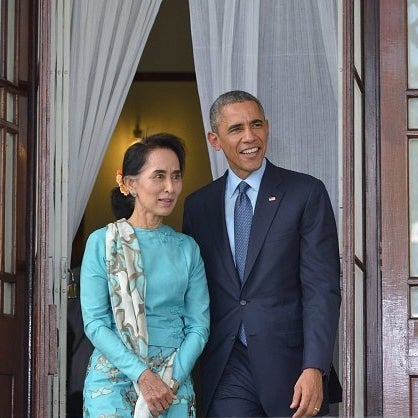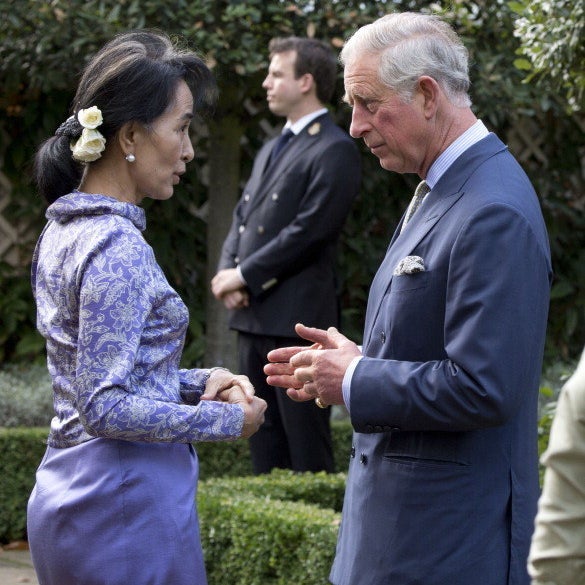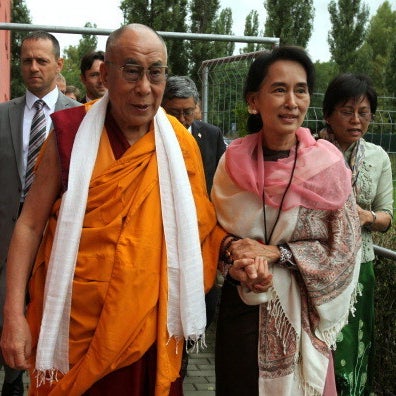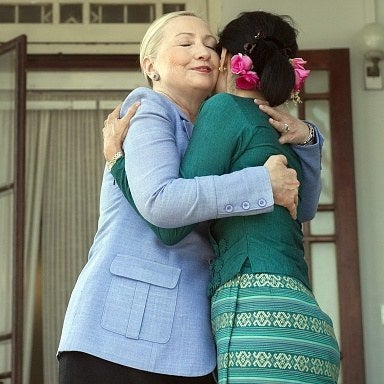Aung San Suu Kyi is a Nobel Prize-winning opposition leader in Myanmar.


She endured years of house arrest in the 1990s and 2000s, confined by Burmese military junta, and became a darling of human rights groups around the world.


But in recent weeks, her reputation has taken a blow — she’s under fire for remaining silent about the Rohingya, a persecuted minority whose exodus from Myanmar is causing a refugee crisis in southeast Asia. The head of Human Rights Watch tweeted this:
Rohingya? Nope, don't see any of them. Aung San Suu Kyi
The Dalai Lama, a fellow Nobel laureate, has also asked why Suu Kyi isn’t demanding better rights for the Rohingya, who aren’t even recognized as citizens in Myanmar.
Even the Dalai Lama thinks Aung San Suu Kyi should be doing more to help the Rohingya persecuted in Myanmar:
And there was a demo in Indonesia's capital last week where protestors asked her to speak up for the group, a Muslim minority in predominantly Buddhist Myanmar.

Suu Kyi's silence has been widely read as stemming from a fear of alienating voters ahead of Myanmar's general election, scheduled for this autumn, which will be the first national poll since she was released in 2010, NPR reported.
Myanmar, formerly known as Burma, was a pariah state ruled by a military junta for almost 50 years until 2011. Suu Kyi's supporters say she will be better placed to help the Rohingya if her party wins the election, whereas speaking up now will achieve little, the BBC reported. But many human rights groups aren't convinced.
"It's a lose-lose situation for everybody, the way she has dealt with this crisis," Mark Farmaner, director of the London-based Burma Campaign UK, told BuzzFeed News. Farmaner said Suu Kyi's silence had cost her support overseas, while nationalist parties at home were continuing to tell mainstream voters that she is pro-minorities anyway.
The National League for Democracy (NLD), Suu Kyi's party, did not respond to an emailed request for comment on her stance from BuzzFeed News. An NLD spokesperson said last month that the Rohingya deserved human rights, after being pressed by reporters, The Guardian reported at the time.
Myanmar's Rohingyas have been fleeing at a particularly high rate so far this year, according to the U.N. In recent weeks, boats of asylum-seekers have been stranded at sea because no country in the region would take them in.

As non-citizens, Rohingyas need permission from local authorities in Myanmar simply to move around and are denied many basic services, human rights groups say. South African Nobel laureate Desmond Tutu and the U.S. philanthropist George Soros have strongly criticized how Rohingyas are treated.
But the recent focus on Suu Kyi, because of her international fame, could be distracting everyone from the real cause of the problem, Amnesty International pointed out in a statement to BuzzFeed News:
Aung San Suu Kyi is a former Amnesty International prisoner of conscience who carries a lot of moral and political weight in both Myanmar and abroad. However it would be wrong to focus the Rohingya issue on what one individual has or hasn't said. The institutionalised discrimination that the Rohingya minority has faced for decades is the responsibility of the previous and current governments.
Burma Campaign's Farmaner told BuzzFeed News, "Yes, it's disappointing that she has been silent, but it's the Burmese government that's carrying out these policies. Aung San Suu Kyi isn't the one persecuting the Rohingya."
